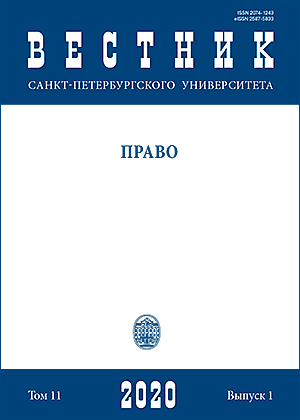Crimes related to illegally carrying out an artificial termination of pregnancy (abortion) in the legislation of foreign countries
DOI:
https://doi.org/10.21638/spbu14.2020.111Abstract
The article presents the results of a study of the criminal law of certain countries in Europe, North America, the CIS and the Baltic countries, establishing responsibility for various acts related to the unlawful termination of pregnancy (abortion). The choice of the respective countries is determined by the development of their criminal legislation (countries of Europe and North America), as well as the unified historical experience and legal similarity of the relevant norms (CIS member states and the Baltic countries). At present, it is necessary to strengthen the legal protection of the life and health of women (reproductive, primarily) in order to improve the demographic situation in the Russian Federation. One of the directions of such strengthening should be to increase the effectiveness of criminal law measures ensuring the protection of the corresponding benefits from criminal assaults associated with unlawful termination of pregnancy. A positive role in this direction is played by the positive foreign experience in countering such criminal phenomena, which should be actively used in the development of amendments to Russian criminal law. The principal feature of the criminal legislation of the countries under consideration is, first of all, the responsibility for various forms of unlawful termination of pregnancy (abortion) associated with the violation of the conditions and safety requirements of its conduct, and not only for one of its types as in the Russian criminal law, where it is established only the responsibility of a person who does not have a higher medical education of the corresponding profile, which positively distinguishes him from the Russian one. The presence in the criminal legislation of the countries under consideration of a significant number of various crimes related to the unlawful conduct of an artificial termination of pregnancy (abortion) (“self-abortion,” facilitating abortion, inducing abortion, failure to notify about abortion, condoning abortion, etc.) is caused, first of all, by the presence of a rather “narrow” list of legal grounds for conducting such a medical intervention. This in turn is a manifestation of the restriction of a woman’s freedom in matters of interrupting pregnancy.
Keywords:
abortion, artificial termination of pregnancy, medical indications, social indications, doctor, a person who does not have (has) a higher medical education of the appropriate profile, promotion of abortion, inducement to abortion, an urgent need
Downloads
References
Downloads
Published
How to Cite
Issue
Section
License
Articles of "Vestnik of Saint Petersburg University. Law" are open access distributed under the terms of the License Agreement with Saint Petersburg State University, which permits to the authors unrestricted distribution and self-archiving free of charge.






